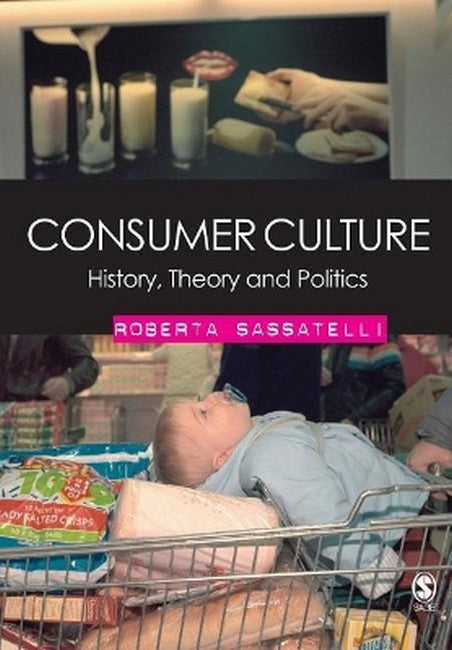THE RISE OF CONSUMER CULTURE Chapter 1: Capitalism and the Consumer Revolution Consumption, Production and Exchange The Genesis of Consumer Capitalism From Courts to Cities, from Luxuries to Fashion Chapter 2: The Cultural Production of Economic Value Commodity Flows, Knowledge Flows The Invention of the Consumer and the cultural trajectories of good Consumer Society as Historical Type THEORIES OF CONSUMER AGENCY Chapter 3: Utility and Social Competition The Sovereign Consumer The Limits of Economic Rationality Fashion, Style and Conspicuous Consumption Beyond Emulation Chapter 4: Needs, Manipulation and Simulation From Commodity Fetishism to Critical Theory Nature, Authenticity and Resistance Post-Modern Pessimism Social Relations and Consumption Chapter 5: Taste, Identity and Practices Taste and Distinction Cultural Classification and Identity Appropriating Commodities Ambivalence and Practice THE POLITICS OF CONSUMPTION Chapter 6: Representation and Consumerism The Anti-Consumerist Rhetoric and the Apology of Consumption Advertising Cultures and their Languages The Functions and Meanings of Ads Ideology, Social Differences and Consumerism Chapter 7: Commodities and Consumers Commoditization and De-commoditization Goods, Values and the Boundaries of Commoditization The Normalization of Consumption Chapter 8: Contexts of Consumption Leisure, Commercial Institutions and Public Places The Home, the Commercialization of Feelings and Cultural Consumption Local Consumption in Mcdonaldized settings Alternative Consumption and Social Movements
Request Academic Copy
Please copy the ISBN for submitting review copy form
Description
This is a model of what a text book ought to be. Over the past decade the original debates about consumption have been overlaid by a vast amount of detailed research, and it seems unimaginable that a single text couuld do justice to all of these. To do so would involve as much a commitment to depth as to breadth. I was quite astonished at how well Sassatelli succeeds in balancing the two. It covers a huge amount of ground in its three main sections which are roughly historical, theories of consumer agency, and finally the politics of consumption... Ultimately, it's the book that I would trust to help people digest what we now have discovered about consumption and start from a much more mature and reflective foundation to consider what more we might yet do. Daniel Miller Material World Blog The author needs to be applauded for taking on the vast challenge of presenting the enormous width and the manifold implications of consumption on the wider social structure and culture of modern societies. In modern markets, people talk, not money. Marian Adolf and Nico Stehr Cultural Sociology Sassatelli's relational approach to consumption certainly avoids falling into deterministic or univocal accounts... She frames her book with a series of dichotomies, swinging theoretical pendulums from apocalyptic pessimism to celebratory freedom... Readers will no doubt be impressed with Sassatelli's refusal to take any single account of consumption without rich and critical questioning. Ashley Mears The Ambivalence of Consumption In just 237 pages Sassatelli has written an impressive survey of an extraordinarily large and varied literature focusing primarily on developments in Europe and North America... And it is this vast compendium of research studies on consumer practices on these two continents carrying us through the present that makes this book so significant. Moreover, to make its contents accessible to students as well as professionals, it is written as a textbook with eight chapters, each of which is followed by a concise summary. Also helpful to readers is an insightful epilogue followed by a concluding section providing the author's recommendations of additional reading for students of consumer culture... To conclude, this is an intellectually impressive book that takes a fresh up-to-date approach to developments in consumer culture on both sides of the Atlantic. And while the author has far greater familiarity with consumer culture on the European side, major North American developments are not overlooked. the result is a new and helpful international approach to consumer culture at the dawn of the twenty-first century. Monroe Friedman Journal of American Cultures In my view, Sassatelli is most successful in offering a thorough introduction to the field... Sassatelli manages to provide useful analyses and to draw interesting connections between the literatures she discusses. I found particularly helpful her discussion of the 'normalization of consumption', whereby consumption that is the product of controlled choice is deemed most legitimate...Sassatelli's advocacy is always qualified. She attempts to incorporate the insights of even the most determinist perspectives, and cautions against going too far in seeing consumption as unequivocally liberating or able to escape structures of inequality. Laura J. Miller Journal of Consumer Culture Sassatelli is true to her word. She does address the history, theory and politics of consumer culture. The book offers a comfortable read. I think the most valuable contribution is the rounding up of many theories that have evolved over time about what is consumer society and why this matters... I did enjoy her discussion of practice tied to the notion of consumer capital... Consumption is hugely significant, and the more chances we have to learn about its history, related theories and attendant politics, the better. Sue McGregor International Journal of Consumer Studies This is a work of impressive scope and depth, covering a substancial amount of ground. The multi-disciplinary nature of the book provides new and revealing insights, and Sassatelli conveys brilliantly the heterogeneity and ambivalent nature of consumer identities, consumer practices and consumer cultures. Furthermore, the author succeeds in discussing these complex issues in a clear and easily accessible way. This text would certainly be suitable for students at the undergraduate or graduate level, and indeed anyone else interested in this area. Newcomers to consumer culture will find this an invaluable primer and introducton to the major concepts and ideas, while those familiar with the field will find Sassatelli's sharp analysis and discussion both refreshing and inspiring. James Skinner Journal of Sociology

